Genetic dissection of apoptosis and cell cycle control in response of colorectal cancer treated with preoperative radiochemotherapy
- PMID: 16686938
- PMCID: PMC1525199
- DOI: 10.1186/1471-2407-6-124
Genetic dissection of apoptosis and cell cycle control in response of colorectal cancer treated with preoperative radiochemotherapy
Abstract
Background: In previous analyses we identified therapy-induced upregulation of the CDK inhibitor p21CIP/WAF-1 and consequently decreased tumor cell proliferation or loss of Bax as adverse factors for survival in rectal cancer treated with radiochemotherapy. Here, we address the individual role of p53 and its transcriptional targets, p21CIP/WAF-1 and Bax, on apoptosis induced by individual components of multimodal anticancer therapy, i.e. 5-fluorouracil (5-FU), ionising gamma-radiation (IR) and heat shock/hyperthermia.
Methods: We analysed tumor samples 66 patients with rectal carcinoma treated by a neoadjuvant approach with radiochemotherapy +/- heat shock/hyperthermia for the expression and mutation of p53 and the expression of p21CIP/WAF-1 and Bax. These data were correlated with the tumor response. The functional relevance of p53, p21CIP/WAF-1 and Bax was investigated in isogeneic HCT116 cell mutants treated with 5-FU, IR and heat shock.
Results: Rectal carcinoma patients who received an optimal heat shock treatment showed a response that correlated well with Bax expression (p = 0.018). Local tumor response in the whole cohort was linked to expression of p21CIP/WAF-1 (p < 0.05), but not p53 expression or mutation. This dichotomy of p53 pathway components regulating response to therapy was confirmed in vitro. In isogeneic HCT116 cell mutants, loss of Bax but not p53 or p21CIP/WAF-1 resulted in resistance against heat shock. In contrast, loss of p21CIP/WAF-1 or, to a lesser extent, p53 sensitized predominantly for 5-FU and IR.
Conclusion: These data establish a different impact of p53 pathway components on treatment responses. While chemotherapy and IR depend primarily on cell cycle control and p21, heat shock depends primarily on Bax. In contrast, p53 status poorly correlates with response. These analyses therefore provide a rational approach for dissecting the mode of action of single treatment modalities that may be employed to circumvent clinically relevant resistance mechanisms in rectal cancer.
Figures
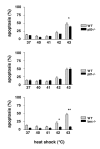
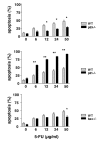
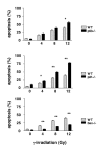
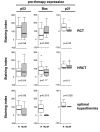
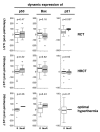
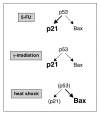
References
-
- Daniel PT, Schulze-Osthoff K, Belka C, Guner D. Guardians of cell death: the Bcl-2 family proteins. Essays Biochem. 2003;39:73–88. - PubMed
-
- Sturm I, Kohne CH, Wolff G, Petrowsky H, Hillebrand T, Hauptmann S, Lorenz M, Dorken B, Daniel PT. Analysis of the p53/BAX pathway in colorectal cancer: low BAX is a negative prognostic factor in patients with resected liver metastases. J Clin Oncol. 1999;17:1364–1374. - PubMed
-
- Sturm I, Petrowsky H, Volz R, Lorenz M, Radetzki S, Hillebrand T, Wolff G, Hauptmann S, Dorken B, Daniel PT. Analysis of p53/BAX/p16(ink4a/CDKN2) in esophageal squamous cell carcinoma: high BAX and p16(ink4a/CDKN2) identifies patients with good prognosis. J Clin Oncol. 2001;19:2272–2281. - PubMed
-
- Schelwies K, Sturm I, Grabowski P, Scherubl H, Schindler I, Hermann S, Stein H, Buhr HJ, Riecken EO, Zeitz M, Dorken B, Daniel PT. Analysis of p53/BAX in primary colorectal carcinoma: low BAX protein expression is a negative prognostic factor in UICC stage III tumors. Int J Cancer. 2002;99:589–596. doi: 10.1002/ijc.10380. - DOI - PubMed
Publication types
MeSH terms
Substances
LinkOut - more resources
Full Text Sources
Medical
Research Materials
Miscellaneous

